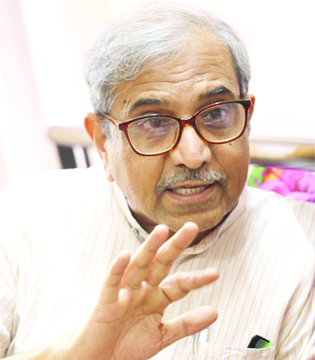Nishikant Khajuria
Noted Gandhian scholar Sudarshan Iyengar has observed that appeasement of minorities by the successive Congress Governments after seventies was the root cause of reactionary Hindu backlash and all inter-religion conflicts in the country must be resolved at civil society level for which communities should sit together.
During an exclusive interview with the Excelsior, he also supported enactment of uniform common Civil Code for all citizens of the country and suggested that constitutional conflict between the Personal Laws and Civil Laws could be worked out through dialogue.
“Leftist discourse changed the mainstream discourse of secularism in India with a Western concept, which led to appeasement of minorities by the Congress Governments for electoral politics,” said Prof Iyengar while talking to this scribe during his recent visit to Jammu in connection with a workshop on Mahatma Gandhi.
Prof Iyengar opined that the upsurge of hardliner Hindus in the country was outcome of reactionary way of thinking by the majority community in the past some time because of appeasement policies of successive Congress Governments towards the minority communities, particularly Muslims.
Maintaining that Mahatma Gandhi had differed with Leftist discourse of secularism and even warned against the same, Iyengar reminded that the Mahatma strongly believed that he was a Sanatani Hindu even as he respected all the religions. “Mahatma Gandhi redefined dharma by including notions of equality, liberty and fraternity, but Congress did not follow him,” he added.
“For us (Hindus), religion is not dominating the culture as we have so many gods and goddesses whereas the same is not in the case of other religions for whom there is one God, one holy book and a set of beliefs,” he explained.
Justifying the incumbent Government’s move of abolishing Haj subsidy, Prof Iyengar, however, hastened to add that there should not be any subsidy for the Mansarovar pilgrimage also. “Secularism should mean maintaining equidistance from all religions. Unfortunately, that equidistance never happened and after the seventies, the test of secularism came to be whether India’s minorities perceived an action as secular or not,” he said and gave example of Shahbano case, in which then the Rajiv Gandhi Government had overturned the Supreme Course verdict.
The Gandhian scholar supported enactment of common Civil Code and opined that constitutional conflicts between the Personal Laws and Civil Laws need to be resolved through dialogue. “A community, which has accepted to be citizens of the country, can’t say that their personal law is above all other laws and in case of any conflict, Constitution of the country should prevail upon,” he said and added that equality before law has to be maintained.
Reiterating that communities should sit together and solve their problems, Prof Iyengar stressed that the matters relating to culture and religion need to be worked out through dialogue among people while the State can aid and facilitate the same. In the religious matters, he added, State should not interfere or use force as using of force can never end conflicts.
“States can’t deliver in this respect and so don’t rely on the State even as there is Constitution and judiciary to address the problems. This has to come in our people’s psyche that ultimately we have to deliver,” he said and added that dialogue at the societal level is the only solution. “Though it is not easy but not impossible even, ” he further said.
Stoutly rejecting the idea of using force in conflict resolution, Prof Iyengar maintained that brute force can never end conflicts at societal level but only love force can do the same. “Gandhiji says when you apply love force, you are duty bound and you look at the merits of other person. If you have done duty with sincerity, you win your rights,’ he explained.
The Gandhian further elaborated that brute force has the problem of winning over physically and not morally whereas in love force, no one wins or loses. However, he lamented that love force was missing these days.
The Gandhian elaborated that love force comes only when you have character and therefore we need to build character with inner growth and self regulation. “In any walk of life, there is lack of character and this is the major crisis of today’s society,” he said and suggested that character building should be started at school level with openness and core of this comes from simple living.
“Simple living is the mantra of character building and core of basics of Indian culture. People, more particularly our middle class need to understand this and change their mindset,” he said and added that making money was not culturally ingrained in India society.
Mr Iyengar, who is Ph D in Economics from M S University and a former Vice-Chancellor of Gujarat Vidyapeeth, said that decentralization of production is the core of Gandhian economics. “And we have to add science and technology with the Gandhian philosophy on local resources and decentralization,” he added while criticizing modern, materialistic civilization.


